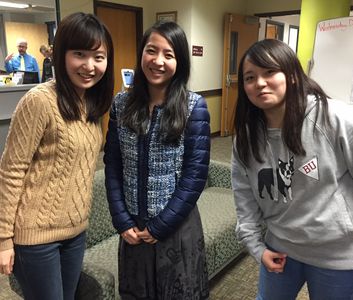Students Enjoy Japanese Cultural Festival
On November 12th, Japanese students at CELOP held an event called “Matsuri: Experience Japan”. The event featured some of the most popular aspects of Japanese art and culture including calligraphy, origami, martial arts, and Japanese food such as yakisoba, chirashi sushi, and karaage (fried chicken).
There were over 30 CELOP students who helped make the event happen, with some assistance from the BU Japanese Students Association. The event was the brainchild of three CELOP students: Miharu Katsuragi, Marino Shimofurutachi, and Megumi Takaku. Cultural events and festivals like this are proposed, planned, and executed by students with the the help of staff. CELOP supports students who want to celebrate their culture and heritage and events like this are held throughout the year.

The student organizers of the Japanese Cultural Festival, pictured left to right: Megumi Takaku, Miharu Katsuragi, Marino Shimofurutachi.
We interviewed the student organizers and asked them about organizing festival:
Q: Why did you organize this Matsuri event?
Miharu: I wanted to introduce Japanese culture to foreigners. That’s why I came here to Boston. I’m interested in why foreigners like Japanese culture, and animation. I want to know why they are interested in them.
Megumi: I’m interested in cross-cultural communication, and then Miharu asked me if I can join to organize the event, and I helped her.
Marino: Since I came here, I have been impressed by different cultures more than different languages. And I feel Japanese culture is very original and introducing it to others. Besides, I wanted to have a different experience, not just study English here, but something more.
Q: What was your experience like organizing this event?
Marino: At first I was worrying if it would work or not, but finally, the event was very good, so I felt very satisfied.
Megumi: It was so fun, but it was sometimes so difficult for me to collect some Japanese cultural things like calligraphy tools, or origami, or Japanese ingredients.
Miharu: It was difficult to organize all the members. Fortunately or unfortunately there were 33 members. Of course each person has their opinions, we had conflict about some things. I think it is difficult to gather up their opinions, and make conclusions.
Q: What have you learned from this experience?
Marino: We first wondered what to introduce to other people. We don’t know what’s interesting for foreigners. I didn’t expect that calligraphy and origami were popular. So I think Japanese culture is more interesting than I thought. I learned more about Japanese culture.
Megumi: We had difficulty deciding how the survey is done. Japanese people always answer surveys out of kindness.
Megumi: I learned the difficulty in cultural difference and how to overcome it. I thought it was so interesting and we learned a lot from it.
Miharu: Actually, I found how much foreigners like Japanese culture, but I didn’t find out why. We introduced Japanese culture, like how to fold origami, or the taste of Japanese food. But next time, I want to introduce why origami is famous for Japan, or why Japanese taste is good, or how it’s different from American taste.






 YouTube
YouTube